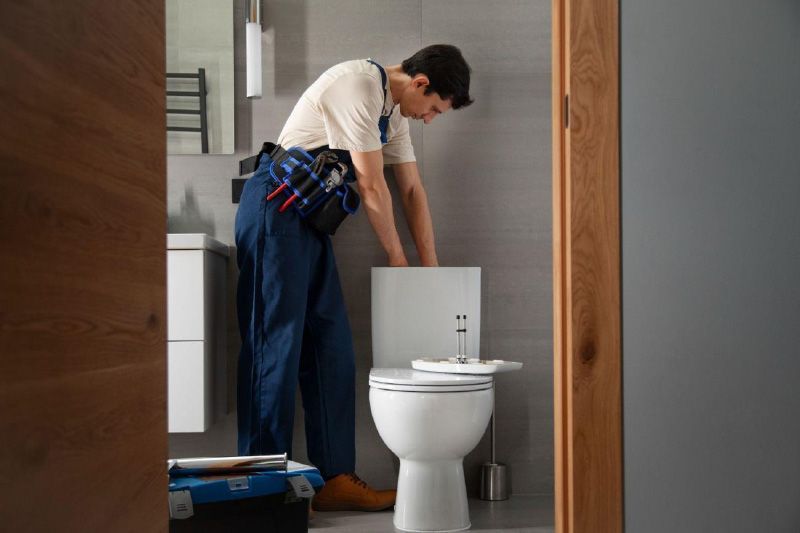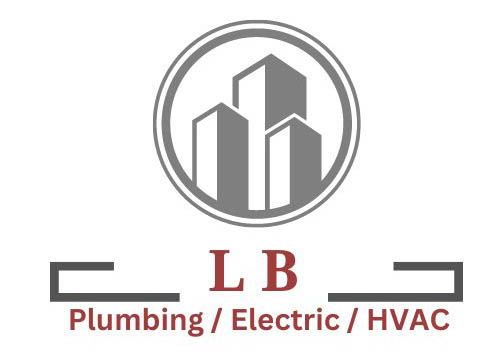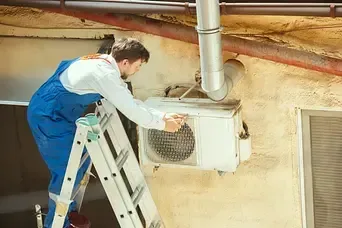The Ultimate Guide to Maintaining Your Energy-Efficient HVAC System
Energy-efficient HVAC systems are designed to optimize indoor comfort while minimizing energy consumption. These modern systems offer numerous benefits, including reduced utility costs, improved air quality, and a smaller carbon footprint. By utilizing advanced technologies, energy-efficient HVAC systems, such as high-efficiency air conditioners and heat pumps, provide consistent heating and cooling tailored to your needs.
Key takeaway: Regular service is crucial for maintaining the performance and longevity of these systems. Regular HVAC maintenance ensures that your system operates at peak efficiency, preventing potential breakdowns and extending its lifespan. Routine checks can help identify issues early, ensuring that your energy-efficient HVAC system continues to deliver its full range of benefits.
In addition to regular maintenance of your HVAC system, it's also important to consider other aspects of your home's environment that can affect overall comfort and efficiency. For instance, water filtration can significantly improve the quality of water in your home, which in turn can enhance the performance of certain HVAC components like humidifiers.
1. Understanding Energy-Efficient HVAC Systems
Energy efficiency is a critical factor in modern HVAC technology, setting energy-efficient systems apart from traditional ones. These systems are designed to use less energy while delivering the same level of comfort, reducing both environmental impact and utility costs.
Definition and Differences:
Energy-efficient HVAC systems employ advanced technologies and designs to optimize performance. Unlike conventional systems, they often include features like variable-speed motors, smart thermostats, and improved heat exchange capabilities. This results in lower energy consumption and enhanced indoor air quality.
Types of Energy-Efficient Systems:
- Heat Pumps: These versatile systems can provide both heating and cooling by transferring heat between the indoors and outdoors. They're particularly effective in moderate climates where extreme temperatures aren't common.
- High-Efficiency Air Conditioners: Equipped with superior compressors and evaporator coils, these units offer significant reductions in energy usage compared to standard models. They are suitable for areas with high cooling demands.
- Geothermal Heat Pumps: Utilizing the earth's stable underground temperature, these systems provide efficient heating and cooling year-round. Ideal for eco-conscious homeowners looking for long-term savings.
Selecting the right type of system depends on specific needs, climate conditions, and space requirements. Each option offers unique benefits tailored to various residential or commercial environments, aligning with the goal of maximizing energy efficiency. Proper HVAC installation is crucial to ensure these energy-efficient systems function optimally and deliver the expected benefits.
2. The Importance of Regular Service
Regular maintenance of your energy-efficient HVAC system is not just a recommendation—it's essential for ensuring optimal performance and longevity. Regular service allows these systems to operate at peak efficiency, which translates into tangible benefits for homeowners and businesses alike.
Key Benefits of Regular HVAC Service:
- Operational Efficiency: When HVAC systems are serviced regularly, they maintain their designed operational efficiency, which helps in reducing strain on components and preventing unexpected failures.
- Improved Energy Efficiency: A well-maintained HVAC system consumes less energy, directly translating into reduced utility bills. This is particularly relevant for those looking to maintain energy-efficient systems like high-efficiency air conditioners or heat pumps.
- Extended Equipment Lifespan: Preventative measures ensure that minor issues are addressed before they escalate into major problems. This proactive approach significantly extends the lifespan of your equipment, saving you money on premature replacements.
For residents in Nashville seeking reliable HVAC service, local experts such as L & B Plumbing & Electrical offer comprehensive maintenance solutions tailored to keep your system running smoothly throughout the year. Embracing regular service not only enhances the comfort of your indoor environment but also provides peace of mind knowing that your investment is protected.
3. Key Components of HVAC Maintenance
Coil and Fins Maintenance
In the world of energy-efficient HVAC systems, maintaining the coils and fins is crucial. These parts are vital for the heat exchange process, so keeping them in good shape is necessary for top performance. When dirt builds up on the coils, the system struggles to absorb and release heat, resulting in higher energy usage and lower efficiency.
Why Coil Cleaning is Important:
- Heat Exchange Efficiency: Clean coils allow for better heat absorption and dissipation, ensuring your HVAC system operates efficiently.
- Energy Consumption: Dirt buildup forces your system to work harder, using more energy and increasing utility costs.
- System Longevity: Regular coil cleaning prevents overworking the system, thus extending its lifespan.
Steps for Effective Coil Maintenance:
- Turn Off Power: Always shut down the power supply before performing any maintenance tasks on your air conditioner.
- Use a Brush or Vacuum: Gently remove loose debris from the coils using a soft brush or vacuum cleaner.
- Apply Coil Cleaner: Use a specialized coil cleaner to remove stubborn dirt and grime.
- Rinse Thoroughly: After the cleaner has set, rinse the coils with water to clear away any residue.
Fins Maintenance:
The fins surrounding the coils also need attention. Bent fins can obstruct airflow, reducing efficiency.
- Fin Comb Usage: A fin comb can be used to straighten bent fins, restoring proper airflow.
- Regular Inspection: Schedule periodic inspections to ensure fins remain in good condition.
Maintaining these components not only improves indoor air quality but also supports overall system health. Regular air filter cleaning further complements this by preventing dust accumulation within the system. Prioritizing these maintenance tasks positions your HVAC system for peak performance while minimizing the need for frequent air conditioner repair services.
Ductwork Inspection
Inspecting ductwork is essential to maintaining the efficiency of your energy-efficient HVAC system. Leaks in the ductwork can significantly compromise both heating and cooling performance, leading to increased energy consumption and higher utility bills. Identifying and sealing these leaks ensures that your HVAC system operates at peak performance.
Steps for Effective Ductwork Maintenance:
- Leak Detection: Regularly inspect ducts for any visible leaks or damage. Use smoke pencils or infrared cameras for more comprehensive detection.
- Proper Sealing: Seal detected leaks using mastic sealant or metal tape, ensuring a tight seal that prevents air from escaping.
- Insulation: Insulate ducts in unconditioned spaces to maintain airflow efficiency and prevent energy loss.
In addition to duct inspection, maintaining indoor air quality through regular air filter cleaning is vital. Clean or replace filters as needed to prevent dust buildup, improve airflow, and enhance overall system performance. Incorporating these maintenance tasks into your routine will keep your HVAC system running smoothly while safeguarding good indoor air quality.
4. Risk Reduction Through Regular Checks
Regular checks are crucial for preventing breakdowns in energy-efficient HVAC systems. By actively finding and fixing potential problems, you can avoid the hassle and expense of emergency repairs. Regular inspections help catch early signs of wear and tear, stopping small issues from turning into big ones.
Benefits of Regular Checks
- Early Detection: Routine assessments allow for the early detection of issues such as worn belts, faulty electrical connections, or refrigerant leaks. Addressing these promptly ensures your system continues to operate smoothly and efficiently.
- Resolution of Potential Issues: Regular checks enable HVAC professionals to resolve potential problems before they lead to unexpected breakdowns. This preventive measure not only saves you from discomfort but also protects your investment by prolonging the lifespan of your equipment.
Energy-efficient HVAC systems are designed to deliver optimal performance while minimizing energy consumption. However, without regular service, their efficiency can be significantly compromised. Maintaining a schedule for regular inspections is key to ensuring that your system remains reliable and efficient year-round.
In summary, making consistent checks a part of your maintenance routine is crucial. It secures the longevity of your system while providing peace of mind that comes from knowing you're reducing the risk of costly emergency repairs.
5. Compliance with Warranty Requirements
Following warranty compliance is crucial for keeping your energy-efficient HVAC system in good shape. Manufacturers usually have specific maintenance guidelines that need to be followed to keep the warranty valid. These guidelines often include regular check-ups and servicing by qualified professionals, making sure every part works perfectly.
Skipping regular maintenance can lead to voided warranties, leaving you responsible for expensive repairs or replacements that could have been covered. This shows how important it is to understand and follow the manufacturer guidelines that come with your system.
To maintain warranty compliance, it's important to keep precise service records. Write down details of each service visit, such as:
- Date of service
- Details of maintenance performed
- Name and contact information of the technician
These records act as evidence that your HVAC system has been maintained according to the manufacturer's specifications. They provide useful documentation in case any warranty disputes come up, ensuring you're protected from unexpected costs.
Regularly going over these guidelines and keeping detailed records not only protects your investment but also helps your HVAC system run efficiently and last longer. This proactive approach ensures that you stay within the terms of your warranty while getting the most out of your energy-efficient equipment.
6. Cost Savings Associated with Maintenance
Routine maintenance of your energy-efficient HVAC system is an investment that pays dividends through significant cost savings. Consistent upkeep prevents minor issues from escalating into major problems, reducing the need for expensive repairs.
1. Lower Repair Costs
Regular service helps identify and fix small faults before they become costly repairs. For instance, replacing a worn-out belt is far less expensive than repairing damage caused by a broken one.
2. Energy Efficiency
Well-maintained systems operate more efficiently, leading to lower utility bills. Clean filters and coils ensure that your system doesn’t work harder than necessary, saving energy and reducing wear and tear.
3. Extended Equipment Lifespan
By ensuring all components are functioning optimally, routine maintenance prolongs the life of your HVAC system. This means you can delay the expense of purchasing new equipment.
Consider this example: A simple investment in annual maintenance can result in up to 30% savings on energy costs compared to neglected systems. Over time, these savings add up, making regular servicing a financially sound strategy.
Embracing routine maintenance not only enhances comfort but also leads to tangible financial benefits, underscoring its value as a strategic approach to managing household expenses effectively.
7. Get Your HVAC System Ready for Each Season
Getting your energy-efficient HVAC system ready for each season is crucial to keep it running smoothly all year round. Different seasons have different requirements—for example, in summer, you'll need to make sure your air conditioning units are clean and working properly to handle the heat.
Why Regular Maintenance Matters
Regular maintenance is essential because it helps your system adjust to changing temperatures, improves its performance, and prevents unnecessary strain. By taking proactive steps such as adjusting settings and checking parts before seasonal changes, you can enhance comfort levels and avoid expensive breakdowns.
Remember, just like we discussed in "Energy-Efficient HVAC Systems: Why Regular Service Is Key," maintaining a regular inspection schedule is vital for consistent indoor climate control.
FAQs (Frequently Asked Questions)
What are energy-efficient HVAC systems?
Energy-efficient HVAC systems are advanced heating, ventilation, and air conditioning technologies designed to provide optimal indoor comfort while consuming less energy compared to traditional systems. They include options like heat pumps and high-efficiency air conditioners that cater to various space requirements.
Why is regular service important for HVAC systems?
Regular service is crucial for HVAC systems as it ensures they operate at peak efficiency, leading to improved energy efficiency, reduced utility costs, and an extended lifespan of the equipment. Preventative maintenance helps identify potential issues before they escalate into costly repairs.
What key maintenance tasks should be performed on HVAC systems?
Key maintenance tasks for HVAC systems include cleaning air filters, inspecting ductwork for leaks, and maintaining coils and fins for optimal heat exchange efficiency. Regularly performing these tasks helps maintain good indoor air quality and ensures the system operates effectively.
How can regular checks reduce the risk of HVAC breakdowns?
Regular checks can significantly minimize unexpected breakdowns by allowing for early detection and resolution of potential issues within the HVAC system. This proactive approach prevents emergency repairs and enhances overall system reliability.
How does routine maintenance affect warranty compliance?
Routine maintenance is often a requirement set by manufacturers to keep warranties valid. Neglecting regular service can lead to voided warranties. Keeping accurate service records is essential for warranty compliance and can protect homeowners from unexpected repair costs.
What cost savings can be associated with regular HVAC maintenance?
Regular HVAC maintenance leads to significant cost savings over time by reducing repair expenses and lowering energy bills. A well-maintained system operates more efficiently, which translates into lower utility costs and fewer emergency repair needs.





